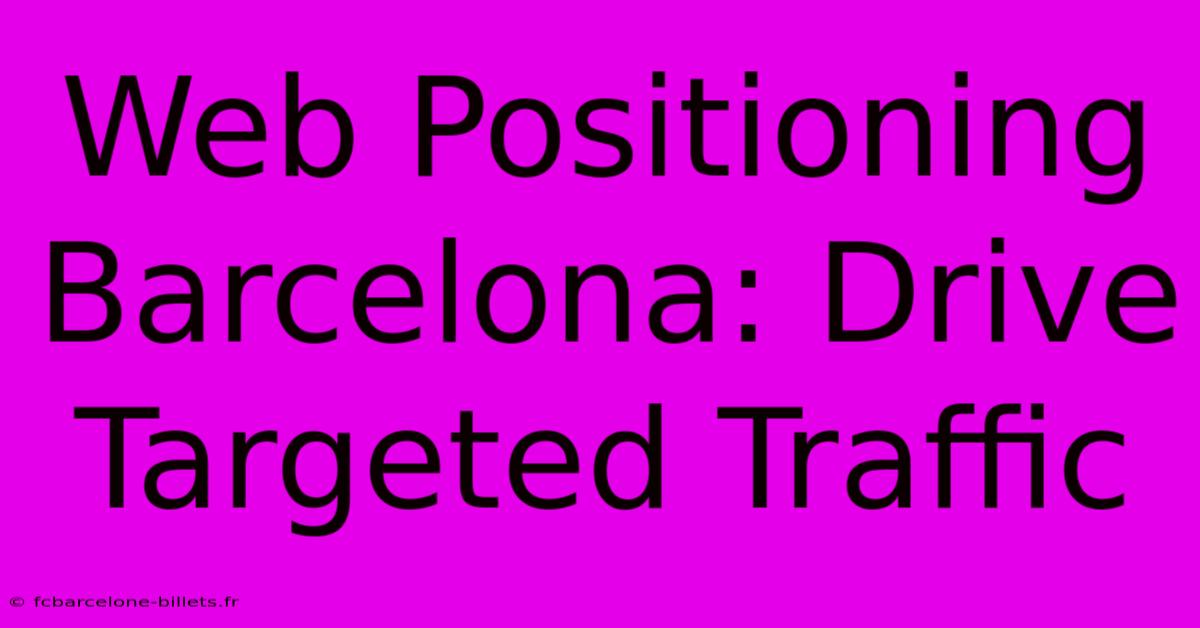Web Positioning Barcelona: Drive Targeted Traffic

Table of Contents
Web Positioning Barcelona: Drive Targeted Traffic to Your Business
Barcelona, a vibrant city brimming with businesses of all sizes, presents a competitive landscape for online visibility. Standing out requires a robust web positioning strategy, also known as SEO (Search Engine Optimization), specifically tailored to the Barcelona market. This comprehensive guide will delve into the strategies to drive targeted traffic to your Barcelona-based business.
Understanding the Barcelona Digital Landscape
Before diving into specific tactics, it's crucial to understand the unique characteristics of the Barcelona digital market. Consider these factors:
- Language: While Spanish is dominant, Catalan is also widely used. Your website and content should cater to both languages for maximum reach.
- Competition: Barcelona is a major city, meaning competition for keywords is fierce. A well-defined niche and strong keyword research are vital.
- Mobile Usage: Mobile usage is high, so your website must be mobile-friendly and optimized for speed.
- Local SEO: For businesses serving the Barcelona area, local SEO is paramount. This includes Google My Business optimization and citation building.
Key Strategies for Effective Web Positioning in Barcelona
1. Keyword Research: The Foundation of Success
Effective keyword research is the cornerstone of any successful SEO campaign. Identify relevant keywords with high search volume and low competition. Tools like SEMrush, Ahrefs, and Google Keyword Planner can assist in this process. Focus on long-tail keywords (longer, more specific phrases) to target niche audiences. Examples include: "best Italian restaurants Barcelona," "web design agency Barcelona," or "affordable apartments near Sagrada Familia."
2. On-Page Optimization: Enhancing Your Website's Structure
On-page optimization involves optimizing elements within your website to improve search engine rankings. Key aspects include:
- Title Tags and Meta Descriptions: Craft compelling title tags and meta descriptions incorporating your target keywords. These are crucial for attracting clicks from search engine results pages (SERPs).
- Header Tags (H1-H6): Structure your content using header tags to improve readability and signal importance to search engines. Incorporate keywords naturally within these headers.
- Image Optimization: Optimize images with descriptive alt text containing relevant keywords. This improves accessibility and helps search engines understand the content of your images.
- Content Quality: Create high-quality, engaging, and informative content that satisfies user intent. Content is king, and Google rewards websites with valuable, unique content.
- URL Structure: Use clear, concise, and keyword-rich URLs.
3. Off-Page Optimization: Building Your Website's Authority
Off-page optimization involves activities performed outside your website to improve its authority and ranking. Essential strategies include:
- Link Building: Acquire high-quality backlinks from reputable websites within your industry. Guest blogging, directory submissions, and collaborations are effective ways to build links.
- Social Media Marketing: Promote your website and content on relevant social media platforms to increase brand awareness and drive traffic.
- Local Citations: Ensure your business information is consistent across various online directories and platforms. This is particularly crucial for local SEO.
- Online Reviews: Encourage satisfied customers to leave positive reviews on Google My Business and other relevant platforms. Positive reviews boost your local SEO and build trust.
4. Technical SEO: Ensuring a Smooth User Experience
Technical SEO focuses on the technical aspects of your website that impact search engine crawlability and indexing. This includes:
- Website Speed: Optimize your website's loading speed to improve user experience and search engine rankings.
- Mobile Friendliness: Ensure your website is responsive and displays correctly on all devices.
- XML Sitemap: Submit an XML sitemap to Google Search Console to help search engines index your website's pages efficiently.
- Structured Data: Implement schema markup to provide search engines with more context about your website's content.
Measuring Your Success: Tracking and Analysis
Regularly track your website's performance using Google Analytics and Google Search Console. Monitor key metrics like organic traffic, keyword rankings, and conversion rates. Analyze your data to identify areas for improvement and refine your SEO strategy accordingly.
Conclusion:
Effective web positioning in Barcelona requires a multi-faceted approach. By implementing the strategies outlined above and consistently monitoring your results, you can drive targeted traffic to your business and achieve sustainable online success in this competitive market. Remember, SEO is an ongoing process; continuous optimization is key to maintaining a strong online presence in Barcelona.

Thank you for visiting our website wich cover about Web Positioning Barcelona: Drive Targeted Traffic. We hope the information provided has been useful to you. Feel free to contact us if you have any questions or need further assistance. See you next time and dont miss to bookmark.
Featured Posts
-
Barcelonas Premier Bowling Entertainment
Apr 03, 2025
-
Planning Your Barcelona Trip Know The Cathedral Dress Code
Apr 03, 2025
-
Your Perfect Transfer Barcelona Airport Shuttle
Apr 03, 2025
-
Luxury Golf Resorts In Barcelona Spain
Apr 03, 2025
-
Barcelona Fashion Weeks Hidden Stars Brands To Watch
Apr 03, 2025
